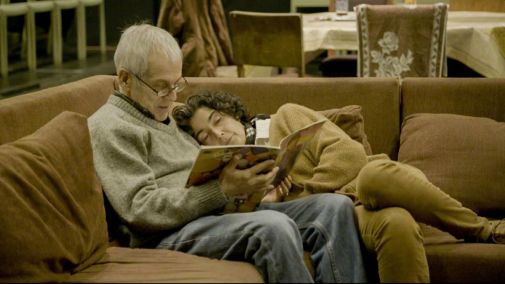By Glenn Charlie Dunks

After garnering a (somewhat surprising?) Oscar nomination for The Mole Agent in 2020, Chilean director Maite Alberdi’s next feature was always going to be on people’s radar. With The Eternal Memory she has yet again returned to stories of the elderly in society. Unlike Mole, which had a comedic touch (I’m surprised Diane Keaton hasn’t optioned the film rights), The Eternal Memory is strictly dramatic in its telling of the ravages of Alzheimer’s Disease to one of her home country’s most celebrated journalists and authors, Augusto Góngora.
As you might expect, this isn’t an easy watch. Anybody who has seen what dementia does to a person will recognise many of its subject’s hardest moments. It’s probably a hardened soul who wouldn’t shed a tear by its end.
Góngora, who died in May this year, was pivotal throughout the Pinochet regime as a documenter of the dictator’s crimes against humanity and against the Chilean people. In the years following Pinochet’s fall, he remained a vital journalistic voice in ensuring those crimes against his own people were never forgotten. Memory is at its best when weaving this career history with that of Góngora’s present as a man whose own memory fails him on a daily basis. From being a face recognised as one of truth and dignity to sometimes not even being able recognise his wife, actress and politician Paulina “La Pauli” Urrutia who takes care of him every day following his diagnosis. When Alberdi and editor Carolina Siraqyan bring these two distinctive yet linked stories together, the film is resonant and artful, incorporating incredible archival footage that evokes Pablo Larraín's No.
Unfortunately, even at just 84 minutes, there is not enough of that. We land in Góngora and Uttutia’s story in media res. For viewers who don’t necessarily know the story of these two individuals, it doesn’t take too long to suss it out. But there was clearly space within the story to delve slightly deeper and learn more about their lives as activists, storytellers and leaders. For stretches, Alberdi is content to simply sit and observe (and in its second half, much of the camerawork is done by Pauli herself due to Covid-19 restrictions). Which probably helps the film achieve its goals to show how Alzheimer’s can take a hold of somebody with such ferocity. But from a storytelling point of view, it means there is little dramatic thrust beyond watching a man lose his identity to a terrible disease and I’m not sure if that’s entire enough.

The concept of Chile and memory are not new. At least from what we get to see of Chilean cinema, Patricio Guzman has been expertly documenting such efforts across films like Nostalgia for the Light and The Pearl Button. Elsewhere beyond Chile, films such as last year’s Last Flight Home did something similar to what Alberdi is attempting here, but with more success.
Alberdi’s camera remains transfixed on the couple. Within this, she finds moments of wonder, beauty and heartache. As it stands, then, The Eternal Memory is a good film that observes how a couple handles the frightening passage where one begins to forget the other—and even himself. But that’s not all The Eternal Memory appears to be about and therefore it doesn’t quite land as a satisfying work of documentary. It’s lopsided, and by emphasizing one half of her story over the other, Alberdi ends up doing a disservice to her subjects.
Release: Currently in limited release from MTV Documentary Films.
Award chances: I would be surprised if it doesn’t make the 15-wide shortlist. While I am clearly not as keen on it as most, I would probably be predicting it at this stage for a nomination.